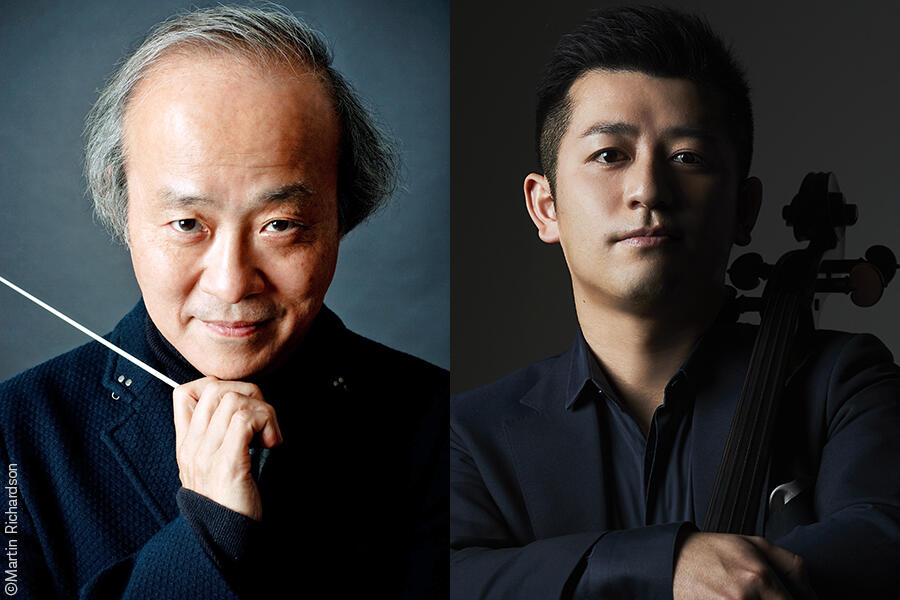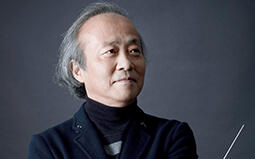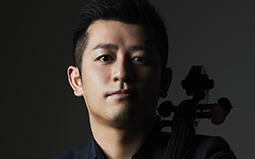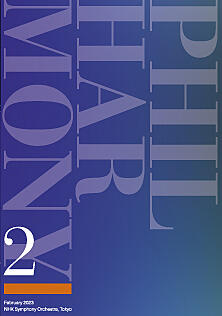- Home
- Concerts
- Subscription Concerts 2022-2023
- Program A
- No. 1977 Subscription (Program A)
No. 1977 Subscription (Program A)

Program
Hisatada Otaka / Cello Concerto A Minor Op. 20
Born in Tokyo, Hisatada Otaka made a significant contribution to Japan's classical music during the first half of the twentieth century. He studied conducting and composition twice in Vienna where he was trained by, above all, Felix Weingartner before making his Japanese debut in 1941 leading the New Symphony Orchestra (currently the NHK Symphony Orchestra, Tokyo). From the following year, Otaka served as the ensemble's chief conductor for a decade.
A wartime piece, the Cello Concerto was written in 1943 and premiered the next year in Tokyo by the composer himself conducting the afore-mentioned orchestra and the country's top cellist Takashi Kurata. This forceful and lyrical work represents Otaka’s style deeply influenced by German Romanticism retaining its tonal and formal firmness. The first sonata movement in A minor opens with the orchestra's mighty clunk immediately followed by the cello solo giving the energetic first theme. The tenderer second theme in F major is also first sung by the soloist. The central movement consists of the theme and its five variations brimming with mellifluous melodies. The A-minor finale has a slow expressive introduction succeeded by the main Allegro section in rondo form (A–B–A–C–A). The valiant rondo (recurrent) theme A, again first appearing with the cello solo, is in stark contrast to the dance-like melody B with light footsteps, and to the gently flowing theme C in five-beat time. The coda closes the concerto both vigorously and dramatically.
The audience of today's concert witnesses a precious stage, as the work is conducted by Tadaaki Otaka, the composer's youngest son and internationally active musician who has established close ties with the NHK Symphony Orchestra like his father.
[Kumiko Nishi]
Panufnik / Katyń Epitaph
The Polish-born composer, pianist and conductor Panufnik was at the mercy of times just like his country’s hero Chopin was so, a century earlier. The younger man left Poland in the mid-1950s escaping from the communist regime to continue his musical career mainly in the United Kingdom. Incidentally, back in 1930s, Panufnik met Hisatada Otaka in Vienna where the two young musicians, born only three years apart, deepened friendship as the fellow disciples of Weingartner.
Panufnik as a composer left a dense catalogue including ten symphonies and Katyń Epitaph. Written in 1967 and revised in 1969, the latter makes us face a tragic historical event we should never forget. Indeed, according to the composer, it is dedicated to “the memory of the 15,000 Polish patriots who were slaughtered” by the Soviet secret service NKVD in Katyn Forest during World War II.
Katyń Epitaph evolves slowly with a transparent texture, the emotional tension being only mounting. It begins with the grievous violin solo in a high register taken over by the woodwinds’ long passage. Thereafter a crescendo with strings gradually heads for the tutti fortissimo conclusion. This orchestral epitaph is shut by ominous timpani roll as if to denounce the cold-blooded massacrers.
[Kumiko Nishi]
Lutosławski / Concerto for Orchestra
Lutosławski played a leading role in Poland's modern music scene following the footsteps of Karol Szymanowski (described on p. 45 [Symphony No. 4 Op. 60]) whose music deeply impressed the young Lutosławski even before the latter entered the Warsaw Conservatory in 1927. As for their compatriot Panufnik above mentioned, he was Lutosławski's close friend and piano duet partner.
Lutosławski's early output is marked by folk-inspired, disciplined yet flowing style under the influence of the Hungarian master Bela Bartók (1881–1945). And the junior composer's large-scale Concerto for Orchestra written between 1950 and 1954 is considered the culmination of his early period: from around 1958 on, he would walk a new path taking more avant-garde, experimental approaches.
Although his Concerto for Orchestra has the exact same title as Bartók's masterpiece (1943), here Lutosławski treats materials derived from various Polish folk songs in highly individual, elaborate ways. The reason why the latter embarked upon such monumental work for a large orchestra was a commission from the Polish conductor Witold Rowicki, then the artistic director of the Warsaw Philharmonic. Lutosławski spent as long as four years to complete the work for them who first performed it in Warsaw in 1954.
The initial movement Intrada (Introduction) starts with F-sharp drone note underpinning cellos intoning the 9/8-meter main theme which is a traditional tune from Mazovia (the region around Warsaw). This theme is developed in a contrapuntal (polyphonic) way until we hear Stravinsky's Rite of Spring-like wild stomping chords. The middle movement is in A–B–A form based on different folk materials. Its outer section A, entitled Capriccio notturno (Nocturnal Caprice), is a hushed scherzo dominated by perpetual motion, while the section B, Arioso (In the Manner of an Air), is a clamorous brass trio. The vast final movement consists of two sections featuring Baroque-related forms sharing the same folk tune: Passacaglia is a series of colorful variations on a given bass melody which is here an eight-bar theme introduced by contrabasses at the opening. Following a quietly tense moment, the virtuosic Toccata section begins powerfully, then oboes and clarinets would eventually sing a benign Corale (Chorale) so the orchestra reaches an impassioned apotheosis.
[Kumiko Nishi]
Artists
 ConductorTadaaki Otaka
ConductorTadaaki Otaka
Tadaaki Otaka was born in 1947, and studied conducting with Hideo Saito at the Toho Gakuen School of Music. After winning 2nd prize at the 2nd Tokyo International Music Competition for Conducting, he became Conductor Trainee of the NHK Symphony Orchestra. His collaboration with the NHK Symphony Orchestra spans half a century since 1971 when he first conducted the orchestra. He has occupied the position of Permanent Conductor of the NHK Symphony Orchestra since 2010 while also serving as Music Director of the Osaka Philharmonic Orchestra since 2018. Other positions he has held include Conductor Laureate of the Tokyo Philharmonic Orchestra, Music Director Emeritus of the Sapporo Symphony Orchestra, Honorary Guest Conductor of the Yomiuri Nippon Symphony Orchestra and Honorary Conductor Laureate of the Kioi Hall Chamber Orchestra, and at the same time, making guest appearances with major orchestras across Japan. He has, on the other hand, spent many years overseas serving as Chief Conductor of the BBC National Orchestra of Wales in Britain and was honored with the title of Conductor Laureate.
He is also ardently contributing to educating young artists as Professor Emeritus at Tokyo University of the Arts, and since 2021, he has served as the chairman of the jury of the Tokyo International Music Competition for Conducting. His name became known to the wider public for conducting the theme music for many of NHK's Sunday night saga dramas including Seiten wo Tsuke telling the story of his great-grandfather Eiichi Shibusawa in 2021.
He is from a musical family, his father, Hisatada Otaka, being a composer and conductor, his mother Misaoko a pianist, and Atsutada, his brother, a composer. Cello Concerto composed by Hisatada Otaka, his father, in 1943 will be performed in this month's concert. The other two works by Polish-born Panufnik and Lutosławski were those he conducted in the May 2008 subscription concerts, and also seem to be memorable works for him.
[Kotaro Yamazaki, music critic]
 CelloDai Miyata
CelloDai Miyata
Dai Miyata was born in 1986, and started to learn cello at the age of three. After studying at Toho Gakuen Music High School, and graduating from the Soloist Diploma Course of the Toho Gakuen School of Music with honors, he studied further in Switzerland and Germany, and also under the tutelage of Sumiko Kurata and Frans Helmerson. He won the 74th Music Competition of Japan in 2005 and the 9th Rostropovich Cello Competition in Paris as the first Japanese winner. He has been working with famed orchestras both at home and abroad.
He first appeared with the NHK Symphony Orchestra in 2013 performing Dvořák Cello Concerto under Junichi Hirokami, since then he has worked with the orchestra four times. This is going to be his first appearance in the orchestra’s subscription concert. The Cello Concerto composed by Hisatada Otaka (1911–1951), which he will perform, is the work deeply associated with him as it was given the world premiere performance by Takashi Kurata, his tutor Sumiko Kurata's father. Apart from his concert appearances, he has been working over a wide range of genres including performing music in Hamlet stage-directed by Jo Taira, the puppet theatre artist, and a joint-recording of Travelogue with guitarist Yasuji Ohagi, and subsequent local tour. His performance with the Mito Chamber Orchestra under the baton of Seiji Ozawa was recorded on video and was shown at the National Art Festival hosted by Japan's Agency for Cultural Affairs.
[Takuya Katagiri, music critic]
Download
Ticket
Program A
No. 1977 Subscription (Program A)
NHK Hall
Google Map
Seating Chart
Single Tickets Release Date
Pre-sales for Subscribers:Thursday, October 27, 2022
*about subscribers
Sale to General Public:Sunday, October 30, 2022
Price
| S | A | B | C | D | E | |
|---|---|---|---|---|---|---|
| Ordinary Ticket | 8,900 | 7,400 | 5,800 | 4,700 | 3,700 | 2,000 |
| Youth Ticket | 4,000 | 3,500 | 2,800 | 2,100 | 1,500 | 1,000 |
Seating chart Enlarge Print PDF
*tax included
*About Youth tickets (Available at N-Kyo Guide)
*Subscribers receive a 10% discount (Available at NHKSO WEB Ticket and N-Kyo Guide)
*For wheelchair-accessible seats, please refer to the N-Kyo Guide
Starting Dates of Ticket Sales
ANNUAL SUBSCRIPTION TICKETS Mon., July 18, 2022 11:00am
[For Subscribers: Thu., July 14, 2022 11:00am]
SEASONAL SUBSCRIPTION TICKETS (WINTER) Wed., Oct. 19, 2022 11:00am
[For Subscribers: Thu., Oct. 13, 2022 11:00am]
Youth Tickets
Youth Tickets are great options for those of 25 years old and younger
WEB Select 3 Plus
Choose three or more of your favorite concerts and get a discount on single tickets
*Only available at NHKSO WEB Ticket NHKSO WEB Ticket (Accesible from Japan only)
For further information and subscription application
N-Kyo Guide TEL:0570-02-9502
Broadcast
 NHK Educational TVClassical Concert Hall
NHK Educational TVClassical Concert Hall
No. 1977 Subscription (Program A)
Sunday, May 7, 2023 9:00PM - 11:00PM
Program:
Hisatada Otaka / Cello Concerto A Minor Op. 20
Panufnik / Katyń Epitaph
Lutosławski / Concerto for Orchestra
Conductor:Tadaaki Otaka
Cello:Dai Miyata
Recorded:February 4, 2023 NHK Hall
To watch a concert,
(accessible only from inside Japan)
(accessible only from inside Japan)


